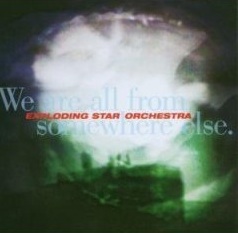Review by Brad Walseth
Composer Rob Mazurek cites sources of inspiration for We Are All Somewhere Else that may somewhat give the uninitiated reader an idea of what to expect: Soviet Sci-Fi philosopher Stanislav Lem, experimental American filmmaker Stan Brakhage, "space and light" artist James Turrell and astronomer/physicist /writer Janna Levin are noted, along with experimental composers like Luc Ferrari and Gyorgy Ligeti who explored the use of electronics and pre-recorded tapes among other things. These influences suggest an artist who is more interested in pushing boundaries and creating Art then in playing "All of Me" for a well-mannered cabaret crowd. And then there are the eels.
Mazurek's much publicized use of recorded electric eels as a component for some of the music on this album may be what brings the curious, but the compositions themselves stand on their own without this unusual, albeit interesting merger of the natural and electronic worlds. As played by some of Chicago's best young players, Mazurek's songs give plenty of space for creativity and imagination by all involved. These players include active vibraphonist Jason Adasiewicz, trombonist Jeb Bishop, reed player Matt Bauder, Corey Wilkes on trumpet, Jim Baker on keys, along with rising stars Jeff Parker on guitar and flautist Nicole Mitchell among others.
The four-part "Sting Ray and the Beginning of Time" starts off powerfully. Having seen the work performed live at Jazz Fest, I can attest to the intensity of this piece, which when played live by the full "orchestra" on the main stage, brought the languid Jazz Fest audience to heart-pounding life. Surprisingly harmonic for experimental music, there is repetition, but Mazurek understands that music is at it's core, repetition and variation, and he composes accordingly. Part two offers delightfully unexpected variation, while Part 3 is free form sonics over eel sounds that showcases Mazurek's joy in soft and/or natural atmospherics, and his ability to work with a more subtle palette (not unlike the breathtaking pieces they performed with experimental trumpeter Bill Dixon at the same Fest).
Mitchell's flute is a true star throughout, bringing sunshine to the at times turgid depths. Parker meanwhile, adds his expressive guitar, showing why he is in such demand here in Chicago for his inventive and sensitive playing. Baker shines during the lovely piano interlude "Black Sun" that bridges the two main compositions.
Part 1 of "Cosmic Tomes for Sleep Walking Lovers" opens up with a sudden free form explosion, including tubular bells by John McEntire and brings to mind a great celebration of life. In Part 2, the cacophony clears and the main theme kicks in with Bauder's bass clarinet pushing the groove; one is reminded of Steve Reich. As instruments drop in and out the music seems to pulse more like waves of light or sound than pre-arranged music. Part 3 is orchestrated a bit more conventionally, with a swinging, nearly recognizable form that almost hints that Mazurek has dipped into Ellington as well as Satie. But of course, the latter's influence prevails through repetition, and the artist can't resist splattering paint on the canvas.
"Fifteen Ways Toward a Finite Universe," is fifteen notes long (shades of Satie) which leads into Part 5 of "Cosmic Tomes." The album ender is a waltz through the dark night of the soul with chimes and groaning reeds and Mitchell's glorious flute lighting the way. Luminous like a visit to Faerieland in a twisted children's book, this haunting piece will leave you feeling like you have encountered the mysterious and unsettling of the universe and have reemerged a changed person for better or worse.
A mutli-media artist of worldwide reknown, Mazurek paints the tones of his musicians onto his compositions with an eye on creating music that is simultaneously wake and mesmerize. Love it, hate it, "We Are All From Somewhere Else" is a recording that will affect you.
|

